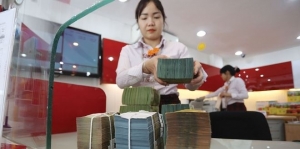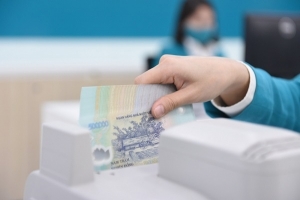Regulations on bad debt trading, settlement revised
 |
| A bank teller counts money at a transaction office in Hanoi. (Photo: cafef.vn) |
Hanoi - The State Bank of Vietnam (SBV) has issued Circular 03/2024/TT-NHNN on bad debt trading and settlement of the Vietnam Asset Management Company (VAMC) to make the work more effective.
The new circular amends Circular 19/2013/TT-NHNN and the more detailed measures will be effective from July 1 this year.
Under the new circular, the VAMC, which is a wholly State-owned entity under the management and supervision of the SBV, can buy only non-performing loans (NPLs) after assessing that those loans can be fully recovered and the collateral can be sold or the borrowers of the NPLs have the prospect of recovering their ability to repay the NPLs.
The new circular also amends and supplements regulations on purchasing NPLs at market value of the VAMC. Accordingly, based on debt purchase plans at market value approved by the SBV, financial capacity, economic efficiency and market conditions, VAMC will decide and will be responsible for bad debt purchase according to market value.
However, VAMC is only allowed to buy a bad debt from credit institutions and foreign banks at the market price, after it hires qualified price appraisal organisations to determine the market price of the debt, besides evaluating economic efficiency, risks and ability to recover capital from the bad debt purchase.
In addition, VAMC must also plan feasible measures to handle the debt and collateral before the purchase.
Though the asset quality of banks in Vietnam was under control by the end of 2023, experts said more attention should be paid to the issue this year, as bad debts are rising.
Experts made the recommendation because, while existing bad debts have not been resolved yet, additional new bad debts are expected to surge when Circular 02/2023/TT-NHNN on allowing commercial banks to reschedule the debt repayment period and maintain the debt group for certain sectors, expires at the end of this month.
The SBV has recently proposed extending Circular 02/2022/TT-NHNN to the end of 2024.
The extension is expected to reduce pressure on enterprises which are struggling to service their debts, and support economic recovery under the current challenging economic situation.
An additional six months is welcomed by most businesses, as well as the banking sector, both of whom have been concerned over businesses' ability to meet the payment deadline of June 30.
Dr Tran Duc Thuc from Ho Chi Minh City University warned that provisions for risky debts were still increasing and in spite of support, banks' bad debts were still rising.
According to Thuc, bad debt will increase in 2024 when corporate bonds come to maturity. The sale of assets is also difficult, so firms do not have money to service debt or to pay bonds. If banks are not allow to extend the payment deadline of existing debts, the debts will be transferred to a worse debt group.
 | Banks containing threats of bad debt The credit quality of BaoViet Bank has receded as the bank’s non-performing loans (NPL) climbed to almost $70 million by the end of 2023, showing a near 50 per cent jump compared to the start of the year. |
 | Lenders increase provisioning to protect against bad debt Deputy Governor of the State Bank of Vietnam (SBV) Dao Minh Tu has revealed that the central bank has greenlit a six-month extension of the debt rescheduling policy according to Circular No.02/2023/TT-NHNN. |
What the stars mean:
★ Poor ★ ★ Promising ★★★ Good ★★★★ Very good ★★★★★ Exceptional
Related Contents
Latest News
More News
- Private capital funds as cornerstone of IFC plans (February 20, 2026 | 14:38)
- Priorities for building credibility and momentum within Vietnamese IFCs (February 20, 2026 | 14:29)
- How Hong Kong can bridge critical financial centre gaps (February 20, 2026 | 14:22)
- All global experiences useful for Vietnam’s international financial hub (February 20, 2026 | 14:16)
- Raised ties reaffirm strategic trust (February 20, 2026 | 14:06)
- Sustained growth can translate into income gains (February 19, 2026 | 18:55)
- The vision to maintain a stable monetary policy (February 19, 2026 | 08:50)
- Banking sector faces data governance hurdles in AI transition (February 19, 2026 | 08:00)
- AI leading to shift in banking roles (February 18, 2026 | 19:54)
- Digital banking enters season of transformation (February 16, 2026 | 09:00)

 Tag:
Tag:




















 Mobile Version
Mobile Version